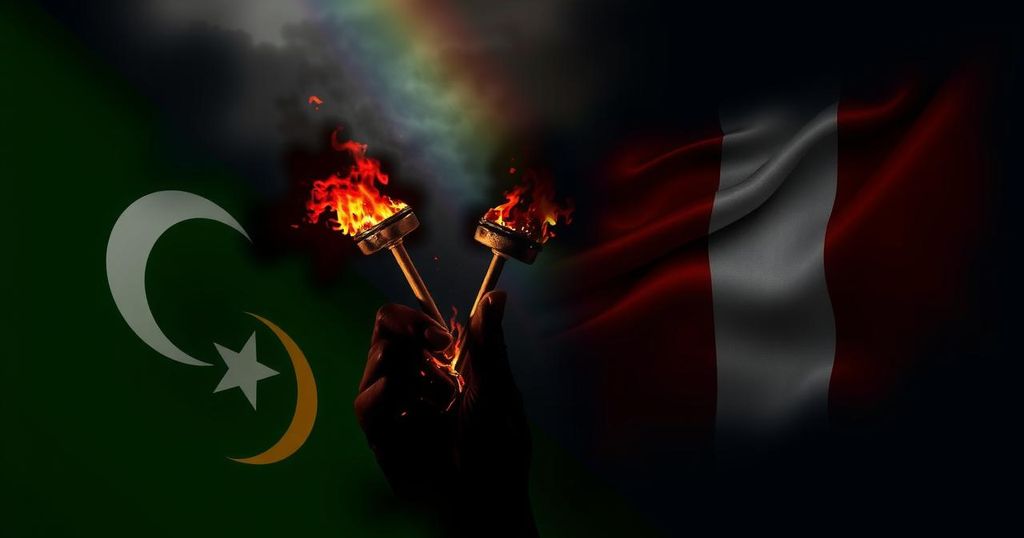The AFCON qualifier between Libya and Nigeria, scheduled for October 15, 2024, is marred by past incidents of hostility and accusations between the teams. Eyewitness accounts suggest that the Libyans exaggerated their grievances over alleged mistreatment during the first leg, while their tactics on the field bordered on unsportsmanlike. Upon the Nigerians’ arrival in Libya for the second leg, they faced significant hardships, raising concerns about CAF and FIFA’s roles in ensuring fair play and safety. This situation exemplifies the broader implications for African football and the urgent need for reforms to promote unity and sportsmanship across the continent.
The upcoming Africa Cup of Nations (AFCON) qualifier between Libya and Nigeria, scheduled for October 15, 2024, serves as a stark reminder of how the sport can become embroiled in chaos and controversy. Instances such as this tarnish the essence of football, which is meant to foster national pride and unity, by introducing elements of international embarrassment and animosity, akin to borderline terrorism. To fully grasp the extent of the turmoil, it is necessary to revisit the initial leg of the encounter held in Uyo, Akwa Ibom State, where the match devolved into a cauldron of accusations and counter-accusations. The Libyan team alleged mistreatment by Nigerian officials and fans, citing inadequate hospitality, transportation issues, and overall hostility. Conversely, Nigerians accused the Libyans of orchestrating provocations aimed at unsettling the Super Eagles, claiming that Libya had received superior hospitality, rendering their grievances as a strategic attempt to undermine Nigerian football administration. Curiously, eyewitness accounts indicate that while tensions were elevated, allegations from the Libyan side appear to be exaggerated or unfounded. Reports suggest that minor issues may have occurred, but they were not severe enough to incite international controversy—pointing to a possible victimhood strategy by Libya preceding the return leg. On the field, Libya’s approach to the match was characterized by negative tactics and unsportsmanlike conduct. Their game plan revolved around frustrating the Super Eagles through time-wasting and overly aggressive plays, which culminated in the controversial disallowance of a clear goal by Ademola Lookman—a decision visibly unjust to all watchers. Following a subpar performance in Nigeria, the Libyan team’s threats of retaliation soon materialized. Upon the Nigerian team’s arrival in Libya for the second leg, they were subjected to significant hardships, including denial of access to basic essentials such as food and water, and impediment from leaving the airport. Their chartered flight even faced rerouting to a remote airport, exacerbating their distress as they were left awaiting transportation amid fears of potential attacks—a move seemingly intended to break their spirit. The role of the Confederation of African Football (CAF) and FIFA thus comes into question. Historically, both organizations have been criticized for their lackadaisical approach to such incidents, often opting for minor penalties rather than imposing necessary strictures that could deter future transgressions. This leads to the concern of fostering goodwill and harmony within the African football community, as situations like the Libya-Nigeria match tarnish the continent’s football reputation and reinforce negative stereotypes about organizational chaos within its sporting landscape. The unfortunate reality is that instances of sportsmanship turned hostile tarnish efforts toward unity in the broader context of African collaboration.
The emerging debacle between Libya and Nigeria ahead of the AFCON qualifiers underscores the fragility of goodwill within African football—a microcosm reflecting broader geopolitical tensions. Past encounters, marred by hostility and accusations, highlight ongoing struggles to maintain sportsmanship amidst fierce rivalries. The importance of sports as a vehicle for bonding among nations may be compromised when football matches become battlegrounds of hostility, overshadowing their unifying potential. The ramifications of such incidents extend into the considerable sphere of international relations and diplomacy, raising fundamental inquiries regarding the effectiveness of football associations to mitigate conflicts and uphold the integrity of the game.
In conclusion, the ordeal faced by the Nigerian team in Libya and the unrest surrounding the preliminary match in Uyo exemplify the pressing need for reform within African football. Stricter disciplinary measures from CAF and FIFA are imperative to address unsportsmanlike conduct and ensure the safety of visiting teams. Furthermore, fostering collaborative relationships between African football federations is essential for nurturing sportsmanship and unity. The issues arising from the Libya-Nigeria affair are a poignant reminder that the quest for brotherhood in African football is ongoing and requires concerted efforts to transcend the chaos that currently plagues it.
Original Source: www.thisdaylive.com







